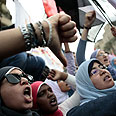
The mass rally in Cairo's central Tahrir Square was the biggest by protesters in weeks.
A smaller group of more than 1,000 marched on the Israeli Embassy, angered by strikes on the Gaza Strip earlier in the day, and pushed for Egypt's new rulers to close the mission and stop Egypt's natural gas exports to Israel.
The protestors demanded cutting all diplomatic and financial ties with Israel and opening the Rafah crossing between Egypt and Gaza.
"Remove the flag, we don’t want it here," they shouted referring to the Israeli flag on the top floor of the building. According to a report by the al-Masri al-Youm newspaper the protestors also burned other Israeli flags.
"We shall remain here until our demands are met and only then will we focus on internal affairs again," one protestor said. The report noted that as demonstrators burned Israeli flags passersby expressed their support by honking. Residents in nearby houses stepped out holding Palestinian flags.
The newspaper also reported that a senior officer tried to calm the protestors who replied that their demands were not subject to negotiation. The officer said he agreed with their claims against Israel and promised to convey them to the army's higher council which effectively rules Egypt.
The protestors also handed out fliers calling for a third intifada to be held on Nakba Day, May 15. The fliers noted that Palestinian refugees are scheduled to leave 30 different locations adjacent to the Israeli border in Egypt, Jordan, Syria and Lebanon.
The march was the first significant anti-Israeli demonstration since Egypt's upheaval began nearly three months ago, and it was an unusual test of the military, which took power after Mubarak's ouster on Feb. 11.
The generals have promised Egyptians greater freedom of expression but at the same time have sought to reassure Israel and its ally the United States that the fall of Mubarak would not mean an anti-Israeli turn in Egypt's foreign policy.
In the past, Mubarak's security forces strictly prevented any protests from getting anywhere close to the embassy, located in a residential building overlooking a bridge over the Nile. Soldiers Friday allowed the demonstration to get nearer than others in the past, to a checkpoint meters away from the building. At the same time, officers at the checkpoint tried to convince the crowd to disperse.
Some protestors were members of the fundamentalist Muslim Brotherhood, who earlier in the day had been leading anti-Israel chants among the crowds in Tahrir and burned an Israeli flag there.
Tanks and armored vehicles, along with armed Egyptian military police, were stationed at the building's entrance. After several hours, the demonstration dwindled.
The Israel-Arab issue has not featured strongly in the 18 day wave of mass protests that led to Mubarak's ouster or in demonstrations since by activists trying to shape the transition period being led by the military. The focus has been more on uprooting Mubarak's authoritarian regime and ensuring a democratic Egypt emerges. Still, the protests have been interspersed with complaints about Mubarak's close ties with Israel, which remains deeply unpopular among Egyptians.
Meanwhile, in Tahrir Square, the crowd shouted, "Execution, execution," as others accused the army of protecting Mubarak and giving immunity to his family, a claim the military denies.
On a stage, protesters set up a cage with the pictures of Mubarak, his family and top aides inside. An activist read out charges against them, and the crowd responded, "We testify that Mubarak, his family and their cronies have corrupted Egypt, politically, economically, impoverished the people and committed crimes of torture and killings."
"He lives in a palace and our poor still in the shanty towns," one protester chanted in a microphone at the square. "We are not leaving here until Mubarak is on trial," another speaker vowed.
- Follow Ynetnews on Facebook















